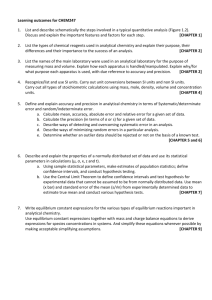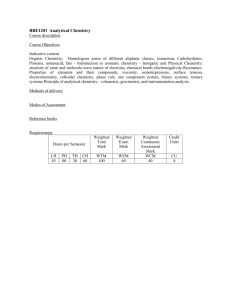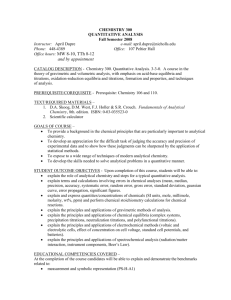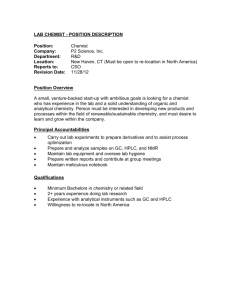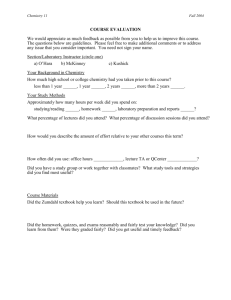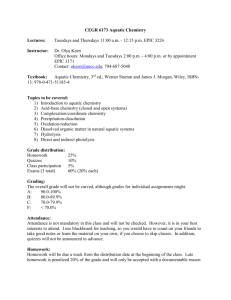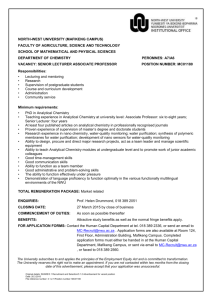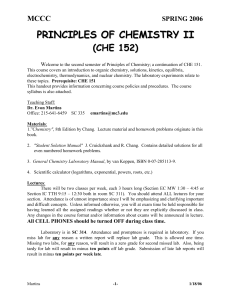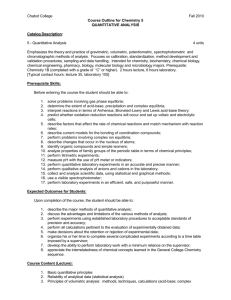CHEM 3212
advertisement
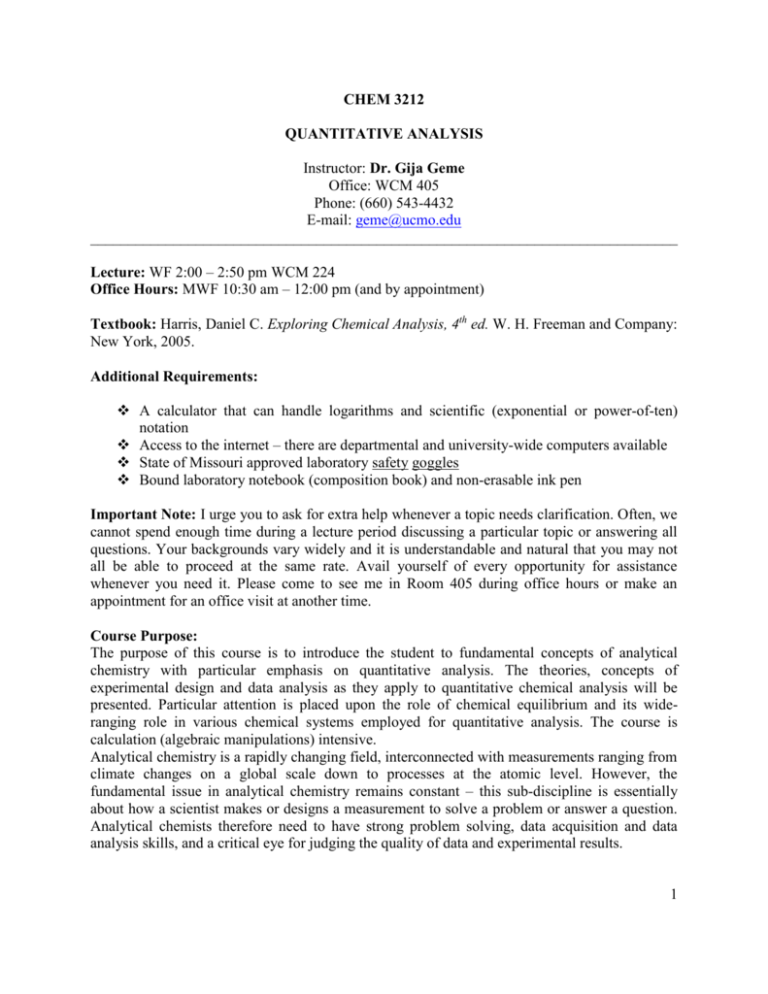
CHEM 3212 QUANTITATIVE ANALYSIS Instructor: Dr. Gija Geme Office: WCM 405 Phone: (660) 543-4432 E-mail: geme@ucmo.edu ______________________________________________________________________________ Lecture: WF 2:00 – 2:50 pm WCM 224 Office Hours: MWF 10:30 am – 12:00 pm (and by appointment) Textbook: Harris, Daniel C. Exploring Chemical Analysis, 4th ed. W. H. Freeman and Company: New York, 2005. Additional Requirements: A calculator that can handle logarithms and scientific (exponential or power-of-ten) notation Access to the internet – there are departmental and university-wide computers available State of Missouri approved laboratory safety goggles Bound laboratory notebook (composition book) and non-erasable ink pen Important Note: I urge you to ask for extra help whenever a topic needs clarification. Often, we cannot spend enough time during a lecture period discussing a particular topic or answering all questions. Your backgrounds vary widely and it is understandable and natural that you may not all be able to proceed at the same rate. Avail yourself of every opportunity for assistance whenever you need it. Please come to see me in Room 405 during office hours or make an appointment for an office visit at another time. Course Purpose: The purpose of this course is to introduce the student to fundamental concepts of analytical chemistry with particular emphasis on quantitative analysis. The theories, concepts of experimental design and data analysis as they apply to quantitative chemical analysis will be presented. Particular attention is placed upon the role of chemical equilibrium and its wideranging role in various chemical systems employed for quantitative analysis. The course is calculation (algebraic manipulations) intensive. Analytical chemistry is a rapidly changing field, interconnected with measurements ranging from climate changes on a global scale down to processes at the atomic level. However, the fundamental issue in analytical chemistry remains constant – this sub-discipline is essentially about how a scientist makes or designs a measurement to solve a problem or answer a question. Analytical chemists therefore need to have strong problem solving, data acquisition and data analysis skills, and a critical eye for judging the quality of data and experimental results. 1 Chemistry Department Goals and Competencies: This course seeks to develop skills and knowledge required by graduates of a chemistry program. The competencies addressed in this course are listed below followed by the types of activities where these areas will be developed, assessed, and evaluated. Collect, analyze, and apply information to solve problems (laboratory, homework problems, quizzes, and exams) Use various laboratory techniques and/or instruments with understanding, accuracy, precision, and safety (laboratory) Think logically within a chemistry framework and be receptive to new ideas and concepts (laboratory, homework problems, quizzes, and exams) Use the language and concepts of chemistry to communicate effectively in oral and written form, to follow detailed instructions, and to function in independent and collaborative settings (laboratory, homework problems, quizzes, and exams) Exhibit the ethical use of knowledge, materials, and procedures that demonstrate an impact on society (laboratory and class discussion) Attendance Policy: Attendance at all laboratory sessions is expected and attendance records are maintained. You may be asked to provide legitimate documentation for missed exam(s) and laboratory sessions (see General Catalog and/or Student Handbook) and you are expected to notify me IN ADVANCE when possible or within 24 hours after the missed class otherwise. This is a laboratory course, and as such it is imperative for students to complete all the laboratory activities to receive credit for the course. Students with Disabilities: All reasonable and appropriate accommodations will be made for students who present a memo from the Office of Accessibility Services (660-543-4421). CHEM 3212 adheres to the guidelines established within the General Education Program for introductory science courses. ______________________________________________________________________________ Course Evaluation: Course grades will be determined by performance on homework, exams, and laboratory exercises. Exams The format of exams will be a combination of multiple choice, short answer, and free response type questions. Homework 2 Problems and questions at the end of textbook chapters will be assigned. Homework problems will be assigned periodically and their due dates will be posted along with the assignment. Homework is designed to both build your skills and provide me the opportunity to assess deeper learning than can be done in an hour exam. Final Exam Final Exam will be a cumulative assessment of the course content covered during the semester. This will be an ACS standardized exam in a multiple choice format. Exam, Homework and Quiz Dates (Other Than The Final Exam) Are To Be Arranged 3 Exams 35% Final Exam 10% Homework 5% Laboratory 50% Course Total 100% Letter Grade Assignments 90-100% = A 80-89% = B 70-79% = C 60-69% = D 0-59% = F This is an approximate grade range and may be adjusted at the end of the semester to a more lenient scale. But do not count on “the curve”. Missed laboratories can only be made up when the instructor has been presented with a written, legitimate, documented reason as defined in the Student Calendar/Handbook or General Catalog, and within the time limit defined therein. Alternative assessments will be used for makeup work. A breach of Central’s Academic Honesty Policy may result in a grade of “F” for the course. This Syllabus is subject to change and Students will be notified of additional changes. 3 Tentative Outline of Lecture Topics Assignments for each lecture period will require reading appropriate sections in the text as well as working assigned problems. Module One: Intro to Analytical Chemistry, Sampling and Calibration, and Acid-Base Equilibria 1. Review of Basic Chemistry Concepts (Students responsibility: Chapters 0-3, much of this material is covered in detail in the laboratory). 2. Introduction to Analytical Chemistry Overview of Analysis (Chapters 0-3). 3. Sampling, Sample Handling, and Calibration (Chapter 4-5). 4. Solving Problems in Chemical Equilibrium and Monoprotic Introduction to Acid-Base Equilibrium (Chapter 8). 5. Buffers (Chapter 9). 6. Polyprotic Acids Acid-Base Equilibrium (Chapter 11.1-11.3). Exam I over Module One (Date to be scheduled) Module Two: More on Chemical Equilibrium; Solubility, Advanced Equilibrium and Complexation 1. 2. 3. 4. Acid-Base Titrations (Chapter 10; Chapter 11.4-end of chapter). Solubility Product (Chapter 6.4). A Deeper Look at Chemical Equilibrium (Chapter 12). EDTA Titrations and Complexation Reactions (Chapter 13). Exam 2 over Module Two (Date to be scheduled) Module Three: Analytical Electrochemistry, Electrode Measurements, and Spectrophotometric Analysis 1. 2. 3. 4. 5. Fundamentals of Electrochemistry (Chapter 14). Electrodes and Potentiometry (Chapter 14-15). Redox Titrations (Chapter 16). Beer’s Law (Chapter 18). Instrumentation and Applications of Spectrophotometry (Chapter 19). Exam III over Module Three (Date to be scheduled) 4
